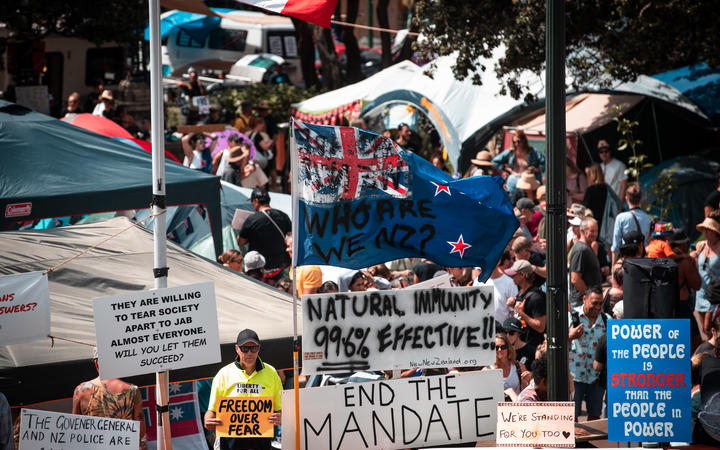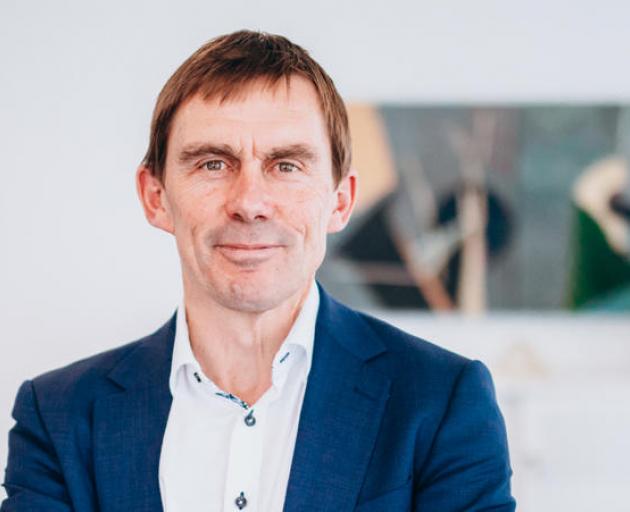
It comes on day 16 of the protest's occupation at Parliament, which turned violent yesterday following a police operation to further encircle the demonstration.
Hunt had a meeting yesterday with representatives from Voices for Freedom and the Human Rights Commission. Others represented included the police, Freedom and Rights Coalition and independents.
"The job given to the Human Rights Commission, Te Kāhui Tika Tangata, by Parliament is to listen, conciliate, educate and advance human rights and responsibilities for all," Hunt said.
"It's clear that the protesters who I have met with have very real stories of loss and suffering. They feel broken and discarded due to the impact of Covid-19 health measures on their lives."
Hunt said some of the protesters had lost loved ones had had "suffered the side-effects of vaccination" or lost their jobs.
"I have a duty to listen to their concerns to understand how their human rights have been impacted.
"In my discussions, I make it clear that I am not affirming their views and I condemn the outrageous conduct of some protesters. I also acknowledge the harmful impact the protest has had on many in our community."
Hunt said listening to the protesters' claims was an important contribution to help prevent the protests from dragging across months or turning into further violence, as other Covid-related protests had overseas.
"In such a heated, fraught moment, we have to move from fear, to hope, and that cannot be done without listening and talking."

The conciliation being led by Hunt would continue in stages and involve a range of stakeholders, including mana whenua, police, the Commission's chief mediator and Wellington Mayor Andy Foster.
Hunt had also asked the Prime Minister to ensure her government engaged in this "constructive process".
Hunt had extensive experience engaging in difficult conflicts as a United Nations Special Rapporteur, including as an investigator into Guantanamo Bay, as well as the Lebanon/Israel conflict of 2006, the statement said.
The Commission recently provided a report on special conditions that vaccine mandates should meet to fulfill human rights requirements.
The Commission has faced an unprecedented increase in complaints and inquiries since the beginning of the traffic light system.
It has also been running a campaign, Dial-it-Down, to encourage people to maintain respectful communication with each other online and in person.
Earlier, Wellington mayor Andy Foster defended twice meeting protesters, saying police had wanted him to do it.

"I got in touch with the police at the highest level and said 'look, do you think this is potentially valuable and helpful' and the answer was yes," he said.
"The police are talking too, and if they didn't think it was worth talking, the police wouldn't be doing it either."
While he respected the government's decision not to engage with protesters, he said only dialogue was going to resolve the protest.
"We can all stand on the sidelines and say "please go" but that's not actually going to achieve that, it's only when you're getting in there and listening to people and talking to people when you actually have a chance of getting a result."
"We're seeing quite a lot of people – business leaders, iwi leaders, significant people and former prime ministers – that are saying that actually there needs to be some dialogue."
Without dialogue he said the only options for resolving the protest were allowing time, or intervening with violence – both of which were unattractive.
He maintained his two meetings had been productive. The first, based around graffiti on the Cenotaph, had resulted in its removal, while the second had focused on reducing the protest's impact on the city.
Foster admitted the protest is made up of diverse groups, and it was difficult to know whether he had spoken to people that could act decisively for the demonstration as a whole.
"It is challenging, and police are finding it challenging to find the people that are going to make decisions … but that's part of talking – if you don't talk, you're never going to know."
He said his meeting with protesters was not legitimising the actions of those that behaved violently.
He did not know when his next meeting with protest influencers would be but expected it to be very soon.
Wellington city councillor Fleur Fitzsimmons said the mayor's meeting with protesters sent a "dangerous message" to people who wanted to be heard by government.
"When he met with the protesters, it sent a dangerous message that the violence and the threats and the spreading of conspiracy theories have no consequence, and that that's how you get heard in this city," she told Nick Mills on Newstalk ZB's Wellington Mornings.
"I really don't want that to be the message to a lot of community groups that try really hard to get the attention of the mayor and councillors."
She said she was "sick to death" of the protest in Wellington.
"These protesters have taken over our streets, schoolgirls are not being educated at school because of these protesters, businesses are closing down, residents are fuming.
"I want them to go home, I am absolutely sick of it."
"But I don't want misleading and dangerous conversations being undertaken by our mayor, because I don't think they're actually likely to help at the end of the day."
Meanwhile, Police Minister Poto Williams said the protests had been "really distressing" for the people of Wellington and particularly for those in close proximity to Parliament.
"Nobody deserves to be living or working in that environment," she said.
"It's distressing that it's come to the point where people are harmed and our police that are trying to keep us safe are being put in harm's way."
She backed "one hundred per cent" the work of police over recent days to minimize the impact of the protest on Wellington, and said the government doing everything it could to support police.
"The police have been extraordinary, they do put themselves on the line and they shouldn't have to have the kinds of treatment they've been getting," she said.
"The protest needs to become lawful if it is to continue. My view is that it shouldn't continue."
She said everyone in the precinct of Parliament had now heard the messaging of protesters, and it was time for them to go home.













